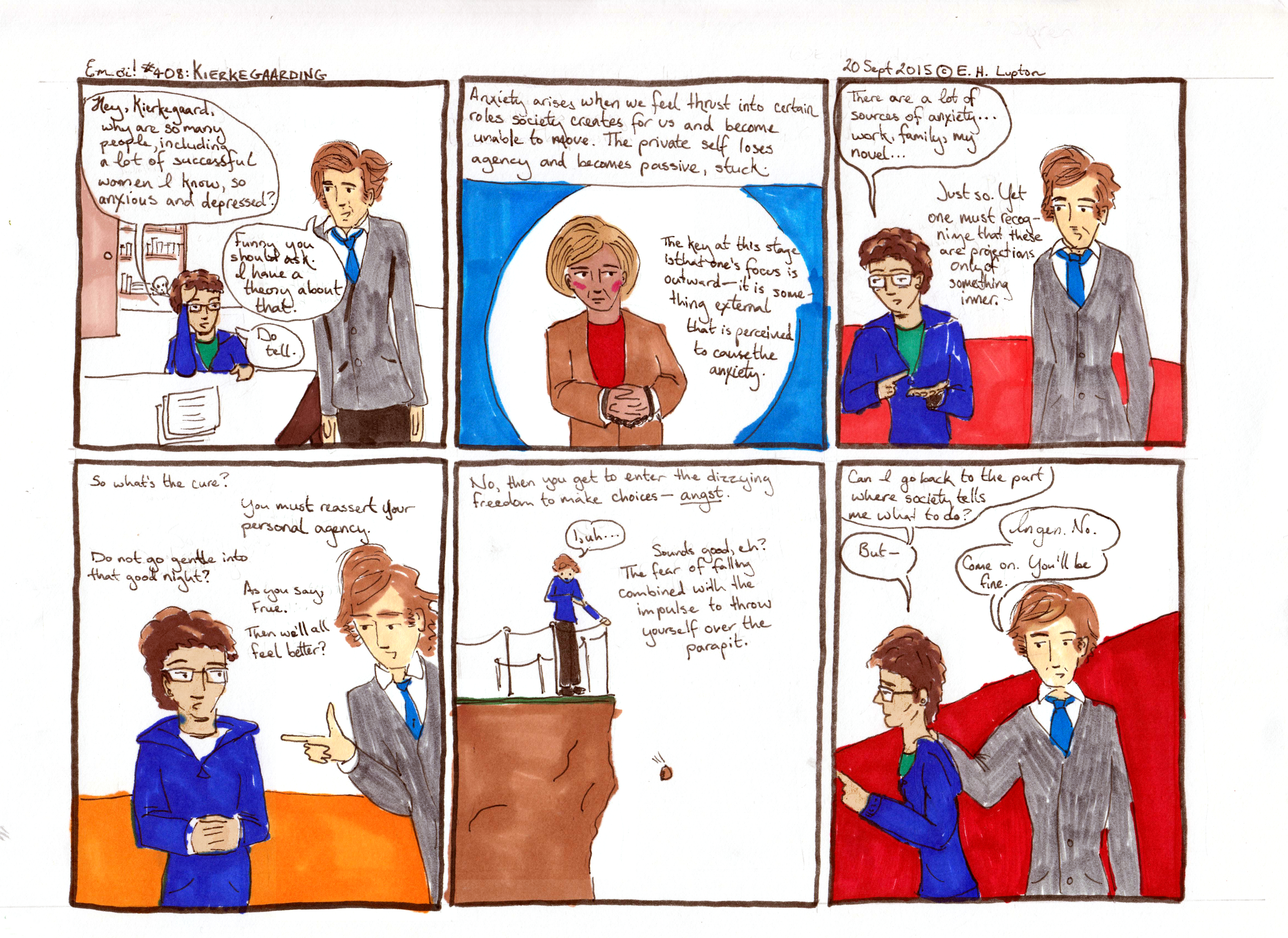
I am forced to begin this week’s lengthy and possibly unreadable commentary on the comic with an apology: I am somewhat misconstruing Kierkegaard here.
Here’s the deal: Kierkegaard wrote a book called The Concept of Anxiety, which is the basis for the ideas that form the underlying framework here, but in the book, Kierkegaard is actually not talking about how difficult your problems are. Instead, he was talking about the responses of different religions to the idea of original sin.[1] That is, he seems to be making an argument like this: 1) Original sin happened, but there were/are people who don’t know about it because they’re not Christian (pagans) or they’re Jewish (??). 2) These groups experience anxiety in different forms (turning outward, in the case of the pagans; turning inward, in the case of the Jews, which is more correct but still unable to come to any resolution, which can only be reached by Christians because Jesus. 3) The angst as freedom of choice is still in there.
If all this sounds a little weird, well–Kierkegaard was kind of a strange guy and his philosophy is a little bit aphoristic. And this is one of his most difficult books.
These anxiety-to-outside/inside relations were distilled by another fellow, Stephen Dunning[2], into the framework that underlies the first three panels (anxiety-in-itself, anxiety-for-itself, and anxiety-in-and-for-itself), and then further distilled by another writer (whose book I cannot name yet, since it hasn’t been published) into yet another form that I’ve adapted here.
In other words, this is based on some secondary materials that somewhat (in my mind) misconstrued the original argument. Le sigh.
Also, I hadn’t used these markers with this type of paper before, and I am disappointed by how it absorbed them. It doesn’t look really as nice in person; I had to do a lot of fixing, some of which is sadly visible. Tch.
I’m currently trying to taper for the Twin Cities Marathon, which is coming up in just over a week. But B is having knee surgery on Monday, so we’ll see how well that goes. My training has been pretty average, but consistent, including consistent speed work, and my ankles are holding up really well (knock on whatever), so I’m guardedly optimistic. If I can get a good taper and decent weather, I hope to hit sub-4. I’ve been running sub-2 hour half marathons in practice, so I have a feeling I can do it. If I don’t get a good taper, I’ll see what I can do. The goal is 3:55:xx, which requires an average somewhere between 8:50 and 9:00 minutes/mile (okay, 8:58 to be precise); of course, the fact that I can sustain that for 13.1 miles is rather meaningless when we’re looking at twice that distance.
Until then, I’m sort of swamped with work, but I will still try to have a new comic up next week as well.
For the nonce, let’s file this one under B4377 L86 2015, for (deep breath) Philosophy(General)–Modern (1450/1600-)–By region or country–Scandinavia–Denmark–By period–19th century–Individual philosophers–Kierkegaard, Søren, 1813-1855–Criticism and interpretation.
[1] Side note: He says, among other things, “Jewish anxiety is over the possibility of guilt, rather than ‘the positing of an actual [guilty] relation'” (Dunning, 153). This is clearly false; Jewish anxiety is over many things, but most of them involve the possibility of disappointing your mother and whether or not this tickle in the back of your throat is going to turn into pneumonia or not.
[2] See Stephen Northrup Dunning. Kierkegaard’s Dialectic of Inwardness: A Structural Analysis of the Theory of Stages. Princeton, NJ: Princeton University Press, 1985. Retrieved from Google Books: Link
